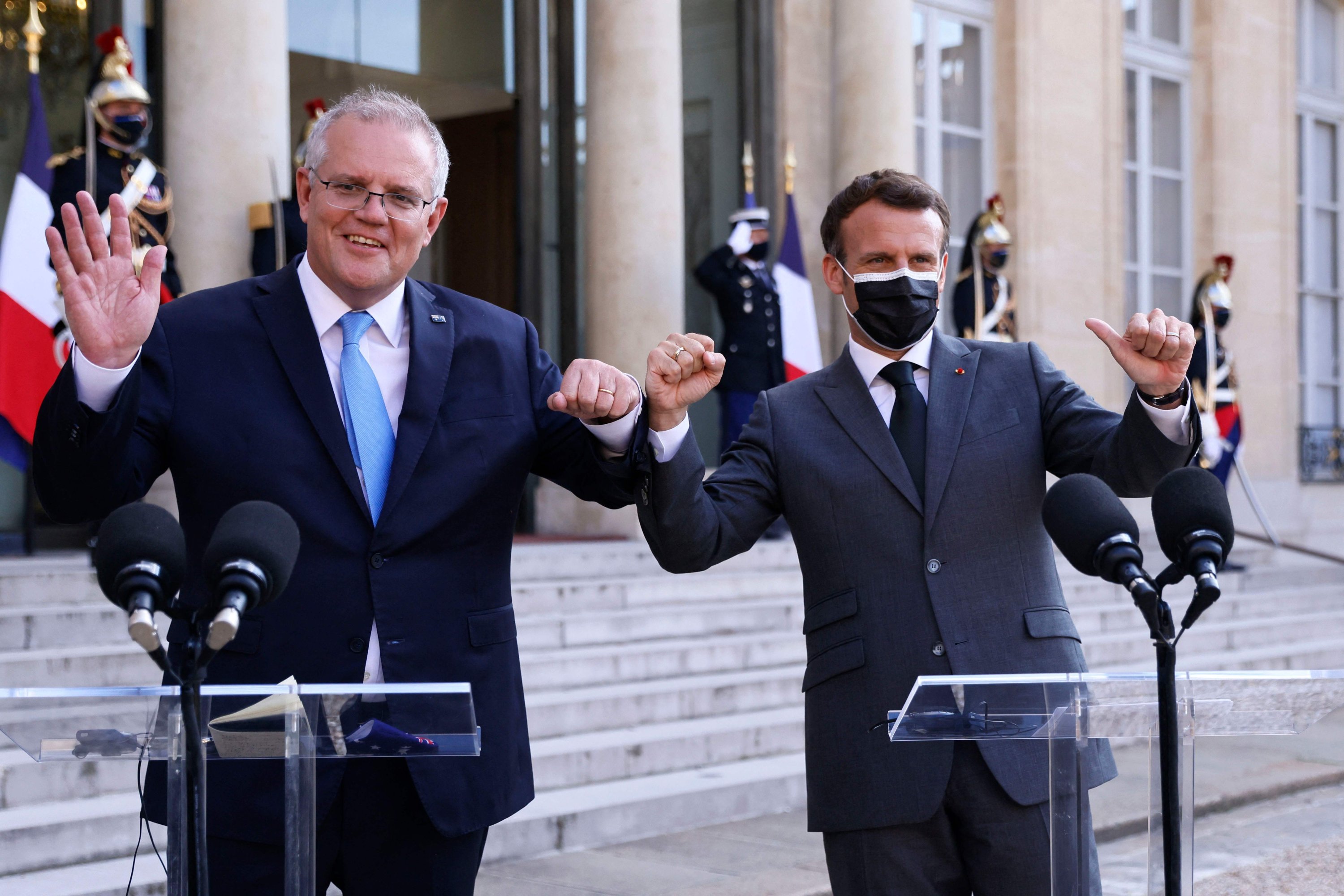Mais quelle horreur! Paris poaching in our paddock leased to Washington

An ancient European power is putting more energy into courting a paramour 11,500 kilometres distant than the young swain next door. The local is forever professing passion but never seems to get his act together.
Australia gives Indonesia just enough oxygen of attention to keep the relationship breathing. We take the world’s fourth most populous country for granted – no risk they’ll turn bolshie as they hate Reds, and don’t sign foreign treaties.
Everything favours us. We’re one huge granary and stockyard. They’re running up the population and running out of farmland, so they’ll need us more than we need them.
The faraway Franks think differently. Long before Scott Morrison was labelled more fibber than cobber, Emmanuel Macron’s government had already launched an ‘Asia-wide initiative in an attempt to halt declining trade figures and improve its overall leverage with the region’. Ironically an earlier version was revealed in Sydney in 2018 BC (Before Covid).

Entente cordiale no more. ScoMo unmasked. Credit Daily Sabah
According to Asia expert, Philippe Le Corre of the Carnegie Endowment for International Peace, the Quai d'Orsay has long maintained ‘sustained ambitions in the Asia-Pacific region.’ That was written in 2016 and the effort hasn’t lagged.
Last September’s deal with the US and the UK sank Australia’s
$66 billion French submarine contract with all Oz reputations on board. FM Jean-Yves
Le Drian responded:
‘My first comment was some sort of betrayal. The second element is a crisis of
trust between historical partners, which is even more of a concern.’
Canberra’s retreat to the cosiness of the Anglosphere infuriated the French, but also re-energised their push into what policy strategists label Australia’s ‘sphere of influence’. By November Le Drian was in Jakarta ‘reaffirming France's commitment to the Indo-Pacific ... and to intensify the relationship with Indonesia.’
While some may think of France as a relic of 19th-century European glamour and the only place to climb the real engineering masterpiece of Gustave Eiffel (there are about 50 imitations around the world), Macron sees his Continental home as ‘a fully-fledged Indo‑Pacific country’.
After the AUKUS decision, Le Corre wrote that France is ‘undoubtedly the most active European country in the Indo-Pacific. The nation has an extensive maritime domain in the region in addition to 1.6 million citizens and a 7,000-men military presence—larger than that of all the other 26 EU member states combined.’
The nuclear-armed Republic is a major arms manufacturer and remains a potent force with eight nuclear-powered subs already underwater. The Indonesian Air Force (TNI-AU) has reportedly grounded the idea of buying Russian aircraft and is now considering the French fighter Dassault Rafale.
Its overseas territories of New Caledonia (which voted 96.5 per cent to reject independence in a December 2021 referendum), Wallis and Futuna, French Polynesia and Clipperton Island, make France the world’s second-largest maritime domain behind the US. France also has the world’s biggest Exclusive Economic Zone, with 93 per cent in the Indian and Pacific Oceans.
Seventy per cent of European containerized trade passes through the Indian Ocean. Just days before the AUKUS deal was announced the French updated their Indo-Pacific Strategy stressing others ‘can count on France’s full commitment. We will continue to play a full role in contributing to the stability of this new strategic space, which is at the core of major global challenges.’
French overseas development assistance was last year $16.8 billion compared with Australia’s $2.8 billion. Another barometer is to measure donations against Gross National Income, aka GNP, where the percentages are 0.44 (France) and 0.22 (Aust).
Le Drian claims
the Indo‑Pacific ‘is becoming the world’s strategic centre of gravity and
because the security, economic, technological and environmental challenges
emerging there are also ours, France and the European Union have interests to
defend, values to promote and partnerships
to forge there.’
When he visited Jakarta in November the FM got to meet President Joko Widodo, a privilege not extended to Australia’s FM Marise Payne when she was in the Big Durian in September and again in November.
Then there’s the soft sell. It’s embarrassing to report that TV channel France 24 – which telecasts in English - outdoes our overseas showcase ABC Australia on every level. During the summer break, ABC executives decided the centrepiece of its overseas telecasts The World should take a break and be replaced by State bulletins.
So foreigners bemused by reports of parochial premiers announcing more controls to cope with the pandemic and the latest Ashes score (Indonesians don’t play cricket), had to click elsewhere for news of Myanmar massacres and the power struggle in Somalia.
The best choice – along with Al Jazeera and BBC World – is the French State-owned service. France 24 treats its viewers as people with interests beyond Home and Away and spends around €100 million (AUD $156 million) a year. In 2019, the ABC's budget for all international operations was $11 million, much the same level as in the 1980s.
Could the French be more reliable as amis de la sécurité than the US? As former PM Paul Keating wrote on this website: ‘America can withdraw from Asia to the safety of its west coast on the other side of the Pacific.’
The French could also retreat to their homeland under a different leader (the Presidential election will be in April), though shrinking La France entire would damage Gallic pride, something no serious candidate would suggest.
Maybe it wasn’t such a smart move to reject the croissants and vin rouge and go back to beer and burgers with old mates. The menu is easier to read, but the indigestion is likely to be painful if – Sacre bleu! - the free trade digestif with the EU—now delayed by the waspish French – never gets to the table.
First published in Pearls & Irritations, 8 January 2022: https://johnmenadue.com/quelle-horreur-paris-poaching-in-our-paddock-leased-to-washington/

No comments:
Post a Comment